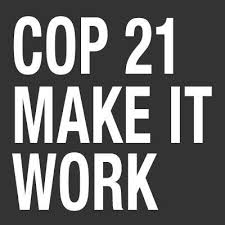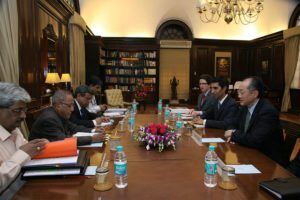

Economy
Leaders Unite in Calling for a Price on Carbon Ahead of Paris Climate Talks
For the first time, an unprecedented alliance of Heads of State, city and state leaders, with the support of heads of leading companies, have joined forces to urge countries and companies around the globe to put a price on carbon.
The call to price carbon comes from the Carbon Pricing Panel – a group convened by World Bank Group President Jim Yong Kim and IMF Managing Director Christine Lagarde – to spur further, faster action ahead of the Paris climate talks. They are joined in this effort by OECD Secretary General Angel Gurria.
This declaration is another positive signal that the low-carbon transition is inevitable and underway – and that Heads of State, global financial institutions and the private sector understand this.
The panel includes German Chancellor Angela Merkel, Chilean President Michelle Bachelet, French President François Hollande, Ethiopian Prime Minister Hailemariam Desalegn, Philippines President Benigno Aquino III, Mexican President Enrique Peña Nieto, Governor Jerry Brown of California, and Mayor Eduardo Paes of Rio de Janeiro.
These global leaders are calling on their peers to join them in pricing carbon to steer the global economy towards a low carbon, productive, competitive future without the dangerous levels of carbon pollution driving warming. Through strong public policy they are providing certainty and predictability to the private sector so they can make long-term investments in climate smart development.
Private sector support comes from US Institutional Investor CalPERS, ENGIE of France, Mahindra Group of India, and Netherlands-based Royal DSM, who will help link business needs with public policies through the Carbon Pricing Leadership Coalition, an action based platform that will be officially launched in Paris on November 30, 2015.
“There has never been a global movement to put a price on carbon at this level and with this degree of unison. It marks a turning point from the debate on the economic systems needed for low carbon growth to the implementation of policies and pricing mechanisms to deliver jobs, clean growth and prosperity,” World Bank Group President Jim Yong Kim said. “The science is clear, the economics compelling and we now see political leadership emerging to take green investment to scale at a speed commensurate with the climate challenge.”
“Finance ministers need to think about reforms to fiscal systems in order to raise more revenue from taxes on carbon-intensive fuels and less revenue from other taxes that are detrimental to economic performance, such as taxes on labor and capital. They need to evaluate the carbon tax rates that will help them meet their mitigation pledges for Paris and accompanying measures to help low-income households vulnerable to higher energy prices,” said Christine Lagarde, Managing Director of the International Monetary Fund.
Around the world, about 40 nations and 23 cities, states and regions have implemented or are putting a price on carbon with programs and mechanisms covering about 12 percent of global greenhouse gas emissions. The number of implemented or scheduled carbon pricing instruments has nearly doubled since 2012, reaching an aggregate market value of about $50 billion.
This collective experience is providing us with the tools to take the vital step towards pricing carbon and is captured in FASTER principles developed by the World Bank Group and OECD, with input from the IMF. These principles are based on fairness; alignment of policies and objectives; stability and predictability; transparency; efficiency and cost-effectiveness; and reliability and environmental integrity.
Carbon pricing is one of the options open to countries as part of the low carbon transition, and the leading figures behind this initiative show the broad recognition that COP21 will transform the rules of the game across a wide group of sectors, and that they need to respond – the Panel’s call is consistent with corporate 100% renewables initiatives and other signs of recognition that things are changing.
The calls for a price on carbon are not made with the aim of getting something in the Paris text. Rather, as Angel Gurria (Secretary-General of the OECD) says in the press release, ‘while COP21 will be important to set the overall framework for the path forward, it is domestic policies such as carbon pricing that will guide us collectively to that future.’ Carbon pricing is one of the solutions that exist now and that can be expanded (e.g. the national cap-and-trade scheme recently announced by China for 2017).
Nicolette Bartlett, Prince of Wales’s Corporate Leaders’ Group: “Business has been supportive of a carbon price for a long time. Clearly this is happening at a national and regional level at the moment and to create a level playing field, the ultimate aim should be for us to be able to realise a global carbon price in the future. We are not expecting that to come out of Paris. But what we do want is for the agreement to create the potential for this to be realised sooner rather than later.”
Damien Morris, Head of Policy at Sandbag: “This new coalition calling for global carbon pricing is welcome, but the example of the EU Emissions Trading Scheme shows that the design of any pricing scheme must be carefully thought through. After a decade, the ETS has failed to drive the emissions cuts needed, and flounders at EUR 8 per tonne of CO2. As new schemes expand, importantly in China, designers must ensure the carbon price is both high and reliable enough to drive low-carbon investment at scale.”


 Features11 months ago
Features11 months agoEco-Friendly Cryptocurrencies: Sustainable Investment Choices

 Energy11 months ago
Energy11 months agoThe Growing Role of Solar Panels in Ireland’s Energy Future

 Energy10 months ago
Energy10 months agoGrowth of Solar Power in Dublin: A Sustainable Revolution

 Energy10 months ago
Energy10 months agoRenewable Energy Adoption Can Combat Climate Change




























